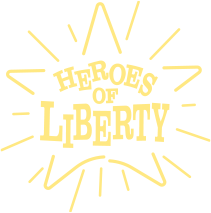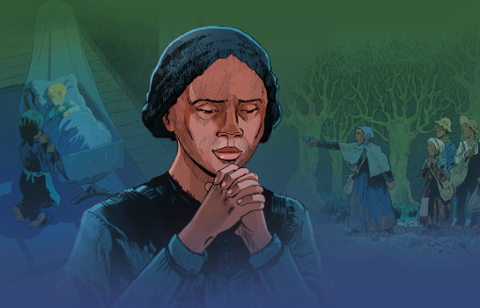Think of America and you likely think of just one word: Freedom. For millions of people around the world, America is a beacon of freedom in an unfree world. But for many within America, that freedom was hard won.
Harriet Tubman was one of those people. Born into slavery in Maryland in around 1820, she was expected to be of use to her owner from her earliest childhood. At just five years old she was loaned out to work as a nursemaid, where she was whipped when the baby cried, leaving her with scars she would carry for life. She once said of her childhood: “I grew up like a neglected weed, – ignorant of liberty, having no experience of it. Then I was not happy or contented.”
Yet despite the hardship, her fiery spirit shone through even in her early years. When she was twelve and working in the fields, one of the other slaves made a bid for freedom. Intrigued, Harriet followed him. When the overseer spotted him sneaking away, the escapee darted into the village store in an attempt to evade him, followed by the overseer and by Harriet.
In the melee that followed, the escapee made for the door. Harriet ran to block the overseer’s path. But the overseer had picked up a heavy weight, and he flung it at the slave. It hit Harriet sharply in the head, splitting her skull and nearly killing her.
Harriet recovered, but for the rest of her life she would have epileptic fits. During these episodes she would sometimes see visions that she believed were from God. “I said to the Lord, I’m going to hold steady on to you, and I know you will see me through,” she later recounted.
As she matured into a young woman, Harriet grew to feel that she had an undeniable right to one of two things: freedom or death. "If I could not have one," she said, "I would have the other."
In 1849 the news came that two of her eight siblings, brothers Ben and Henry, were to be sold. It was a thought Harriet could not bear. She hatched a plan for the three to escape, and on September 17 the three set off, escaping the plantation on which they worked. But when her brothers took fright and turned back, Harriet forged on, making her way eventually north of the Mason-Dixon line and to freedom.
“When I found I had crossed that line, I looked at my hands to see if I was the same person. There was such a glory over everything; the sun came like gold through trees, and over the fields, and I felt like I was in Heaven,” she later recalled.
Yet freedom for herself was not enough. She yearned to have her family with her, and to help others gain their freedom too. Over the next twelve years, Tubman would make repeated trips back to the South to guide slaves to freedom along the Underground Railroad, her family among them. By her own reckoning she personally led about 70 people to freedom and would give directions to many more who made their own way north.
Throughout it all she had two things on her side: God, and her trusty gun which she carried for protection and to encourage her ‘passengers’ not to lose heart and turn back.
Her work as an Underground Railroad conductor was not Tubman’s only contribution to the cause of freedom in America. When the Civil War came she played an active part, collecting intelligence as a spy behind Confederate lines, and even taking part in a raid on plantations along the Combahee River in which more than 700 slaves were freed. The raid was a blow to the Southern economy, and helped swell the ranks of the Union Army.
Tubman was also a committed suffragist, and became good friends with Lucretia Coffin Mott, Martha Coffin Wright, and Susan B. Anthony. As tales of her bravery spread, Tubman gained a reputation as a fearless humanitarian she would also become a friend and acquaintance to many more notable people, including Frederick Douglass, William Henry Seward, and Harriet Beecher Stowe. But it was the prominent abolitionist William Lloyd Garrison who dubbed Tubman ‘Moses’ to her people, after the Biblical Moses who led his people out of slavery to the promised land.
And it is as an abolitionist that we most remember her today, as we celebrate America as the land of the free and home of the brave.
Your children can learn all about Harriet Tubman in our book Harriet Tubman: Faith and Deliverance. Available direct from Heroes of Liberty.






